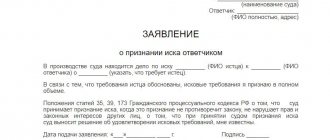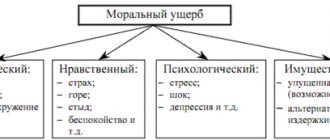7
The official inheritance procedure occurs by filing an application with a notary. Subject to timely application and the availability of the necessary documents, the notary representative opens a probate case. After the established deadlines, the notary issues a certificate of inheritance to the legal successors. However, this is not always the case. From time to time, citizens actually accept property, but cannot subsequently provide indisputable evidence of this fact. As a result, the notary refuses to issue them a certificate. Such heirs have to go to court.
Grounds for filing a claim
The main reasons for refusal to issue an inheritance certificate:
- Missing deadlines for submitting documents.
- Lack of evidence of relationship with the deceased citizen.
- Lack of evidence of actual acceptance of property.
- The documents provided indicate the completion of legal actions after six months.
- Lack of documents confirming the testator’s rights to property discovered after his death. Similar situations are quite common among village residents. Property passes from generation to generation. While the documents remain unformed. Sometimes it happens that a person started building a house, but did not have time to finish it or draw up the relevant documents. A similar rule applies to non-privatized housing. Provided that the tenant has begun the privatization procedure.
- Presence of controversial situations. For example, there are other claimants to the property or a court hearing has begun to challenge the will.
- Other reasons.
Expert opinion
Stanislav Evseev
Lawyer. Experience 12 years. Specialization: civil, family, inheritance law.
Each of the presented grounds excludes the possibility of obtaining a certificate and subsequent registration of property rights. In some cases there is no point in going to court. For example, if there is a hearing to challenge the order. If we are talking about a lack of individual documents or evidence, then the heir should file a claim for recognition of ownership.
Grounds for accepting inheritance through court
Turning to the court during the process of accepting an inheritance is not always caused by disagreements in the division of property. The grounds for registering an inheritance in court may be a lack of documents, missing the deadline for accepting the inheritance, or many other situations. There may be attempts to invalidate the will.
The most common reasons for litigation are:
- Actual acceptance that needs to be legitimized;
- Controversial situations between applicants;
- Attempts to recognize one of the applicants as an unworthy heir;
- Doubts regarding the authenticity of the will, the mental state of the testator;
- Lack of documents;
- The need to prove relationship through an examination;
- The property was not included in the list of the hereditary estate;
- Controversial issues regarding the division of property;
- Missing the deadline for entry into rights.
Judicial practice encounters many situations that require individual consideration.
Conflict and disputable situations between heirs can be of a very diverse nature. Inheritance is determined by the rules of the law, the wishes of the testator, set out in writing and certified by a notary.
If controversial situations arise, the judicial authority will pay attention not only to the order of blood ties, but also to the relationship between the deceased and the applicant. The will drawn up should not contradict legislative acts providing for the allocation of a mandatory part for the socially vulnerable.
The successor may actually enter into inheritance rights. Even such a circumstance will require legalization of rights through the courts. The fact is recognized as accomplished if there is documentary evidence of acceptance of property, maintenance of accounts, payment of utilities, no later than six months after the death of the testator.
We recommend reading: Shares in inheritance
Interested parties have the right to appeal to the court with a demand to recognize one of the receivers as unworthy if there are documented facts of these circumstances. The applicant may commit unlawful acts in relation to the deceased, fail to fulfill obligations to the testator, hide facts, or interfere with the legal division of property. Any appeal to the court must be supported by documents.
The applicant may untimely express a desire to enter into inheritance rights. If there are good reasons, a documentary base, and witnesses, the deadline for entering into inheritance rights can be restored through the court.
The division of property can be done peacefully through a voluntary agreement with other claimants.
If the judicial authority considers the arguments and evidence weighty, it may grant the request. Previously issued certificates are invalidated and property is redistributed.
A will can be challenged under certain circumstances. The owner’s signature may raise doubts, mental deviations are possible, or there may have been irregularities in the drafting process. Facts require evidence; an examination is possible. It is possible to challenge a will and acts of document adjustments.
Often certain objects are not included in the list of the estate. The property may be under construction, the purchase price has been paid, and the documents are being reissued. The applicant will have to provide documentary evidence that the object belongs to the deceased.
How to correctly write an application to the court to receive an inheritance
The form and content of the claim are determined by the norms of the Code of Civil Procedure of the Russian Federation. The law does not provide for a unified application form. However, the document must contain several required sections.
Claim requirements:
- Brevity.
- Consistent presentation of the essence of the matter.
- There is no need to make a 10-page statement of claim. 2-3 pages are enough.
- It is advisable to write the text in small paragraphs.
Components of the claim:
- The introductory part of the claim contains information about the court and the parties to the lawsuit.
- The descriptive/motivational part reflects the circumstances of the case, evidence of the applicant’s correctness and the provisions of the law to which the plaintiff refers.
- The final part contains the final requirement of the applicant.
In some cases, it is better to contact a specialized lawyer. A specialist will study the documents, clarify the circumstances of the case and help you correctly draw up an application.
In this matter, it is also necessary to take into account existing judicial practice. You may need to look at several solutions for a similar situation.
Form
When drawing up a procedural document, you must be guided by Article 131 of the Code of Civil Procedure of the Russian Federation.
Mandatory details of the claim
| No. | Item name |
| 1 | Name of the court in which the hearing is expected |
| 2 | Information about the plaintiff/defendant/interested parties (full name, residential address) |
| 3 | Cost of the claim |
| 4 | The essence of the violated right |
| 5 | Circumstances referred to by the plaintiff |
| 6 | Link to pre-trial settlement of the issue |
| 7 | List of attached documents |
| 8 | Date, signature |
Content
The content of the claim depends on the factual circumstances of the case. Initially, you need to briefly describe the fact of the death of the testator . At the same time, one should refer to the presence of a family connection with the deceased subject .
If there are other applicants, then it is necessary to indicate this fact and list all known successors (full name, residential address).
Below you need to describe the list of inherited property . It is necessary to indicate the type of ownership and location of assets. At the same time, you need to refer to papers that allow you to conclude that the deceased citizen has rights.
The next paragraph should indicate the reason for going to court .
Example. I submitted an application to accept the inheritance. However, the notary refused to issue a certificate due to the lack of documents confirming the ownership of the testator. The owner did not have time to register ownership of the apartment. However, the existence of the right is confirmed by the privatization act.
The last section of the claim usually contains a reference to legal provisions and the plaintiff's request . Then a list of attached documents . At the very bottom of the document is the date and signature of the applicant .
Attached documents
In order for the court to make a positive decision, the heir must take care to provide indisputable evidence. Otherwise, the stated requirements will be rejected. The list of papers depends on the actual circumstances of the case.
At a minimum you should prepare:
- Applicant's identity card.
- Death certificate of the property owner.
- Evidence of relationship with the copyright holder.
- Confirmation of the registration address of the deceased citizen.
- Documents of title to the property of the testator.
- A written refusal of a notary to perform a notarial act.
- Original will (if available).
- Report on the value of identified property.
- Confirmation of payment of state duty.
- Power of attorney addressed to the representative (if any).
Also, the claim must be accompanied by copies of it according to the number of participants in the process (Article 132 of the Code of Civil Procedure of the Russian Federation).
If the successor actually accepted the property, then he will have to prepare documents confirming the completion of legal actions within six months after the death of the testator:
- Contract agreement for construction and repair work.
- Receipt for repayment of debt to third parties.
- Bank loan repayment receipt.
- Agreement on installing an alarm system in an apartment, renting out property.
- A court decision on a claim for debt collection in the interests of the testator.
- Evidence of contacting a notary for the purpose of protecting property.
- Certificate from the dacha cooperative about the use of the land.
- Evidence of payment of land or transport tax.
- Excerpt from the house book.
The list of documents is far from complete. It may be expanded or modified depending on the prevailing circumstances and the actions taken by the applicant.
If the successor was dependent on the deceased subject, then he will have to prepare:
- document confirming loss of ability to work;
- prove the fact of receipt of money;
- prove cohabitation with a deceased citizen for 1 year (for strangers).
Expenses of heirs
When filing a claim to establish a legal fact or recognize ownership rights, you will have to pay a state fee. Its size is determined by law.
When filing an application within the framework of special proceedings, the fee is 300 rubles . These also include cases of restoring the deadline for entering into inheritance. When submitting an application for recognition of ownership rights, the amount of the fee will not increase.
Full/partial tax exemption is granted to disabled people of groups 1–2. To take advantage of the tax benefit, the plaintiff must attach the appropriate document.
Sample statement of claim to the court for recognition of the right to inheritance
Sample statement of claim to the court for recognition of the right to inheritance
Grounds for entering into inheritance through court
There can be many reasons for the need to prove rights through court:
- Claims for an obligatory share in the inheritance;
- Including heirs as unworthy recipients of property;
- The shares are indicated incorrectly;
- The need to prove legal rights;
- Discovery of the existence of a will;
- Recognition of the testator as a relative.
Going to court on the basis of the above may be the right solution to the dispute. The recognition of an heir as unworthy can be appealed through the court.
Actual entry will require judicial proof. The will may be contested. Life circumstances may prevent you from being able to declare your rights to receive property within the period established by law, for example:
- Loss of documents certifying family ties with the deceased.
- The need to recognize property as a share of the inheritance.
The list of grounds for applying to the court in inheritance cases is not exhaustive. Judicial practice indicates that confirmation or protection of inheritance rights may be required under various circumstances.
Each situation will require a reliable documentary base, careful preparation of the claim, and awareness of rights.
Restoring the deadline for accepting an inheritance is possible through the court. An application must be submitted in the prescribed form. Factual evidence of a valid reason is attached to the document. The court will familiarize itself with the facts presented, examine the papers, and interview witnesses. If the arguments are considered valid, the request will be granted. Previously issued documents for inheritance will be invalid.
We recommend reading: What documents are needed to renounce an inheritance?
Upon actual acceptance, it is necessary to prove, document the acceptance. Attached are financial documents confirming the fact, witnesses who can confirm.
It is not always possible to establish the fact of relationship through documentation. The registry office may refuse to issue a copy of the certificate. The refusal certificate must be attached to the case file. It is possible to prescribe a genetic examination.
It is possible to recognize an heir as unworthy through the court. It is necessary to submit documents confirming the evasion of obligations to the deceased.
In some cases, it is necessary to recognize the testator as deceased. There are established deadlines for this, circumstances of the incident that can help complete the procedure.
Rules for filing a claim
The case is being heard in the district court.
Here we need to proceed from the essence of the claims:
- Usually the claim is filed at the place of registration of the defendant.
- If the dispute concerns a real estate property, then the application is submitted at the location of the specific property (house, apartment).
- The counterclaim is filed at the place of consideration of the primary claim.
You can file a claim at any time. In this case, you need to take into account the statute of limitations - 3 years . The countdown begins from the moment when the heir became aware of the violation of his civil rights and the identity of the defendant. The designated period may be reduced depending on the category of the case.
Example. The applicant missed the deadline for submitting documents. In such a situation, an application to the court can be filed within 6 months after the reason for the absence ceases. The hearing of the case takes place at the place of registration of the heir.
Hearing
After receiving the application, the court decides to open legal proceedings:
- If there are comments on the package of documents, the court may leave the claim without progress. The applicant is given time to eliminate the comments.
- If there are no claims to the documents, then the court sets a date for the hearing and sends subpoenas to the participants in the process. At the same time, the defendant is given time to submit written objections to the plaintiff's claims.
Participants in the trial must provide all the evidence they have. If necessary, they can file a petition to request any document from an individual or legal entity (Article 57 of the Code of Civil Procedure of the Russian Federation).
The period for consideration of a civil case is 2 months . Its increase is allowed in exceptional cases (Article 154 of the Code of Civil Procedure of the Russian Federation).
Deadlines and procedure for submitting an application
You can contact a notary and submit an inheritance for registration within six months from the date of death of the testator. After the deadline for accepting the right to inheritance, it is pointless to contact a notary with an application. Registration of documents through the court must be carried out within three years from the date of receipt of information on the subject. This period is no more than ten years when the grounds for the dispute arose. The date is equivalent to the death of the testator.
Resolution of disputes through the court involves certain actions:
- Collect a package of necessary papers. Take it to a notary. The formality is observed to certify the fact of refusal to open rights to property. The notary is obliged to issue a certificate of refusal.
- Collect a package of documents for the court. Prepare an application. Pay the fee. The package of documents must contain a number of copies equal to the participants in the process. Take part in court hearings. Prepare your arguments.
- If the court decision is positive, contact a notary for registration. Get certificates. Complete the documents.
- If refused, you can appeal to higher judicial authorities. The presence of evidence and weighty arguments can influence a favorable outcome of the case.
We recommend reading: Statement of claim for inclusion of property in the estate: sample
Adoption of a judicial decision
Following the hearing, the court retires to the deliberation room. On the same day, the court must announce its decision. If the text of the document is too long, then the court can announce only the operative part of the decision. The full document is prepared within 5 days from the announcement of the court decision.
1 month to appeal a procedural document . If no one files an appeal, the court's decision comes into force. Otherwise, it gains force based on the results of consideration of the complaint in the court of 2nd instance.







